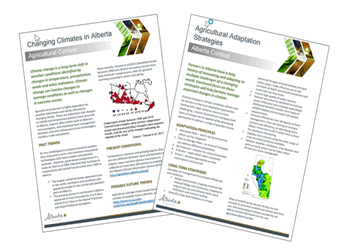| Agriculture's impact on greenhouse gas emissions and vulnerability to extreme weather has been brought into focus recently by increasing attention to changing climates.
Farmers and ranchers in Alberta have already taken many steps to reduce, remove and/or replace greenhouse gas emissions. At the same time, overall production has increased and adaptation to Alberta's changing climate conditions has improved.
Together with all Albertans, farmers and ranchers can benefit from continuing to meet the challenges of a low-carbon economy and bounce back from the negative impacts of changing climates.
Climate Smart Agriculture
Management that increases efficiency of resource use, lowers greenhouse gas emissions and improved adaptation to changing climates is known as "climate-smart" agriculture. Many large multi-national companies support the idea of climate-smart agriculture and expect their suppliers to demonstrate progress towards meeting these goals.
Using advanced agricultural practices, farmers and ranchers in Alberta have already made great progress towards lowering emissions in cropping, livestock and energy systems by increasing production efficiency. Alberta's farmers and ranchers have also successfully adapted to changes in past climate conditions.
By continuing to show leadership and initiative, farmers and ranchers in Alberta can make further efficiency improvements to lower emissions and improve adaptation to changing climates.
Expanded use of proven management strategies outlined below will help farmers to respond to consumer's expectations, remain competitive and capture emerging market opportunities. There's also exciting potential to apply emerging research developments as outlined in the sections to the left.
New Factsheets:
Climate Smart Agriculture in Alberta
Adapting to Changing Climates
Managing Emissions: Cropping Systems
Managing Emissions: Beef Production
Renewable Energy Potential
 | Printable factsheets are available by clicking on the icon shown below .
|
|